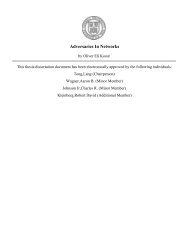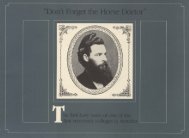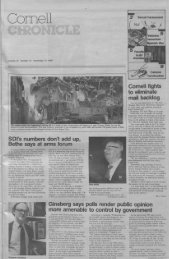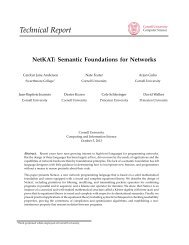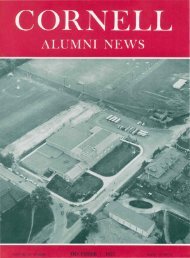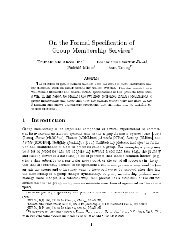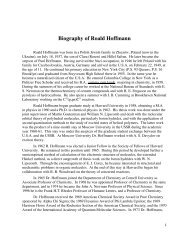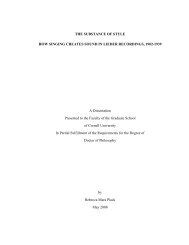Cornell Alumni News - eCommons@Cornell - Cornell University
Cornell Alumni News - eCommons@Cornell - Cornell University
Cornell Alumni News - eCommons@Cornell - Cornell University
Create successful ePaper yourself
Turn your PDF publications into a flip-book with our unique Google optimized e-Paper software.
uilding. Two neighbors who risked<br />
their lives in rescue efforts were David<br />
M. Abbott '35 and Dr. Henry D.<br />
Humphrey, whose wife is the former<br />
Ellen Earle '47.<br />
A memorial service in Sage Chapel<br />
two days after the fire brought more<br />
than 1,500 members of the campus community<br />
together to pay tribute to the<br />
dead. Funds were established in memory<br />
of Professor Finch and the students.<br />
Arthur H. Dean '19, chairman of the<br />
university's Board of Trustees, called for<br />
a thorough study of fire safety on campus,<br />
as did a New York State Senate<br />
group. President Perkins called upon<br />
former vice president Theodore P.<br />
Wright to head up the <strong>Cornell</strong> study.<br />
Two formal probes of the Residential<br />
Club fire itself were under way, one by<br />
governmental officials in the Ithaca area,<br />
and another by the university. The governmental<br />
study was to report to a<br />
Tompkins County coroner's inquest a<br />
week after the fire, but the inquest was<br />
delayed at least an additional week to<br />
allow a complete finding. No announcement<br />
of any preliminary findings was<br />
being made until the complete report<br />
was presented.<br />
The building in which the fire took,<br />
place was of concrete and concrete block<br />
construction, with some basement rooms<br />
and hallways wood panelled. Its original<br />
owner, Robert Reed Colbert '48, had described<br />
it as "the most fireproof building<br />
that could be built."<br />
A Graduate Boost from Ford<br />
The university received a $4 million<br />
grant from the Ford Foundation last<br />
month to support doctoral students in<br />
the humanities and basic social sciences,<br />
as part of Ford's $41.5 million experimental<br />
program to shorten the length of<br />
time needed to earn a PhD. Nine other<br />
universities will receive similar support.<br />
At present, the median time required<br />
to get a <strong>Cornell</strong> PhD in those fields<br />
(ranging from Chinese literature to anthropology)<br />
is five and a half years.<br />
Fields such as linguistics and philosophy<br />
do not get the amount of corporate and<br />
governmental support that flows to the<br />
more technological areas of study, Associate<br />
Dean of the Graduate School Frederick<br />
S. Erdman, PhD '41, explains, so<br />
that many graduate students in such<br />
areas must teach for four or five years<br />
to support themselves.<br />
This is excellent preparation for the<br />
teaching career which many follow, but<br />
it also stretches out their academic work.<br />
On the other hand, Erdman said, students<br />
under conventional full-support<br />
fellowships often do not gain teaching<br />
experience, though they may well earn a<br />
PhD in three years.<br />
The new program provides full support<br />
(tuition and fees and a living and<br />
dependency allowance) for three years<br />
and summer support for four years. All<br />
students under this program will be required<br />
to teach for at least one year,<br />
subject to the requirements of their department,<br />
when they will be supported<br />
by the department. The program is expected<br />
to provide for at least 80 per<br />
cent of doctoral candidates in the humanities<br />
and basic social sciences.<br />
The Ford program aim of more students<br />
completing their doctorates in four<br />
years will markedly affect the rate of<br />
growth in the number of doctorates<br />
granted each year. Donald W. Cooke,<br />
dean of the Graduate School, reports<br />
that in the 1965-66 academic year, the<br />
fields included in the program awarded<br />
fifty-one PhD degrees out of 313 in the<br />
whole university. By 1971, it is expected<br />
that the number will increase to about<br />
150 doctorates annually. There will not<br />
be any large increase in the number of<br />
graduate students actually on campus at<br />
any one time; the increased number will<br />
result from people getting through faster.<br />
Anti-War Feelings High<br />
Several dozen students successfully<br />
violated an unenforced federal law, defied<br />
various student and faculty rules and<br />
orders, and challenged and/or insulted<br />
the university proctor in mid-March as<br />
part of the build-up to a national<br />
"Spring Mobilization" to protest the US<br />
war effort in Vietnam. Several faculty<br />
members and persons associated with<br />
<strong>Cornell</strong> United Religious Work also<br />
stood with the group that violated the<br />
law and challenged the proctor.<br />
The law in question makes it illegal<br />
to destroy or damage one's draft card,<br />
for which the federal government has<br />
prosecuted, or to encourage others to do<br />
so, for which the government had not<br />
prosecuted. A former student, Bruce<br />
Dancis '69, who now lives in Ithaca,<br />
was leader of a national effort to get<br />
at least 500 persons to promise to go<br />
to New York City April 15 and burn<br />
their draft cards to protest the US war<br />
effort. The Ithaca chapter of Students<br />
for a Democratic Society (SDS) announced<br />
plans in early March to take signups in<br />
the lobby of Willard Straight Hall for<br />
the April 15 burning.<br />
In a confused several weeks, a student<br />
committee charged with responsibility<br />
for student activities banned the<br />
signups, students defied the ban, and<br />
some twenty-eight students were cited<br />
for violating the ban and failing to obey<br />
the instructions of the proctor to desist.<br />
A faculty committee put the ban ruling<br />
"in abeyance" awaiting a report of another<br />
special committee that was appointed<br />
to look into side issues raised<br />
by the confrontation. Several students<br />
were put on disciplinary probation, and<br />
others given reprimands. Final disposition<br />
of nineteen cases was also held in<br />
abeyance until the special faculty committee<br />
reported.<br />
During the confrontation, that centered<br />
in a packed Straight lobby for<br />
several days, anti-war demonstrators<br />
heckled Proctor Lowell T. George sharply.<br />
Some 450 members of the campus<br />
community signed a petition apologizing,<br />
including some of the anti-war group.<br />
Faculty members took sides in panel<br />
discussions nearby in the Memorial<br />
Room, to debate the issues raised by advocacy,<br />
civil disobedience, and protest.<br />
One end result of the rhubarb was<br />
that forty-one students were among<br />
those who promised to burn their draft<br />
cards on April 15.<br />
A final twist came in the second week<br />
of April when the Willard Straight student<br />
board banned a cake sale to benefit<br />
the Spring Mobilization in New York<br />
City. The Executive Board of Student<br />
Government ruled the decision to be<br />
suspended until a special student committee<br />
studies "the overall role of Willard<br />
Straight Hall as a student union in<br />
the <strong>Cornell</strong> community and the relationship<br />
of that union to student government."<br />
The student president of the<br />
Straight said he would appeal the overruling<br />
to a faculty committee.<br />
Dancis, leader of the card-burning<br />
effort, was arraigned April 10 before a<br />
federal judge in Syracuse, charged with<br />
violating federal law by tearing up his<br />
draft card on campus December 14. He<br />
pleaded not guilty and awaits trial. Another<br />
federal court had just ruled that<br />
the law under which he was charged was<br />
unconstitutional, but that persons who<br />
did not possess draft cards could be<br />
accused of that constitutionally.<br />
Dean Rusk Is Heard<br />
US Secretary of State Dean Rusk<br />
paid a visit to campus to see his student<br />
son in the midst of the draft card arguments,<br />
and his impending visit was an<br />
May 1967 29




